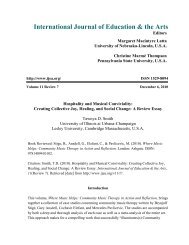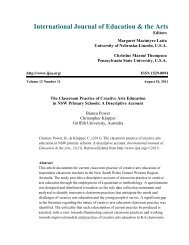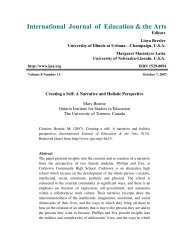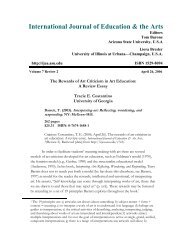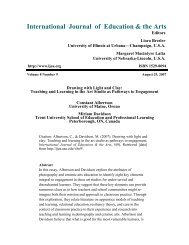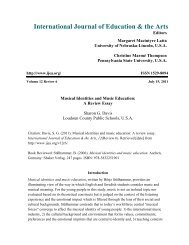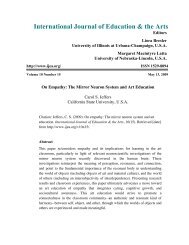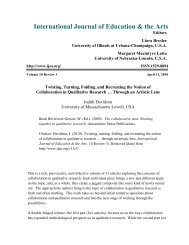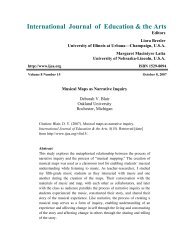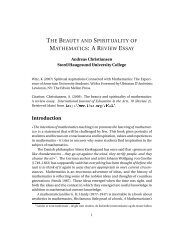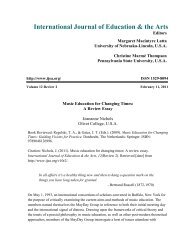Experiences with poetry, pedagogy and participant observation ...
Experiences with poetry, pedagogy and participant observation ...
Experiences with poetry, pedagogy and participant observation ...
- No tags were found...
You also want an ePaper? Increase the reach of your titles
YUMPU automatically turns print PDFs into web optimized ePapers that Google loves.
International Journal of Education & the Arts Vol. 7 No. 1 16Self <strong>and</strong> Other in the Poetry Project: Complicating IdentitiesWalsh’s quote leads us to the final point that this project brought out which is thatthe identities of everyone were complicated over <strong>and</strong> over again. They became blurred <strong>and</strong>confused, <strong>and</strong> shifted frequently along the way, but in ways that did not isolate self <strong>and</strong>other, but rather, brought them together in some sort of complex world.For example, the reader can probably hear my own rather schizophrenic identity inthis paper. I entered as anthropologist-researcher, as critical educator, as program director,<strong>and</strong> as a writer. While one may assume I formed part of an American Self <strong>with</strong> mystudents to be held up to a Mexican Other, more times than not, I identified more <strong>with</strong> theMexican part of myself which shifts me into some un-nameable place on the biculturalcontinuum. Further complicating this was the fact that one of my students was ofHispanic/New Mexican descent, so she had claims as well to some part of the supposedlyOther Mexican identity.In our discussion of writing about local people <strong>and</strong> writing from their viewpoints,students also complicated their own ideas about how the local Mexican Other has identitiesthat overlap <strong>with</strong> the self since many local people speak English, have traveled <strong>and</strong> studiedabroad, <strong>and</strong> so on. Finally, as we wrote, I was also sometimes the student <strong>and</strong> my studentssometimes the teachers in that some of them knew significantly more than I did aboutformal <strong>poetry</strong> writing.Thus, we ended up <strong>with</strong> more questions than answers, <strong>and</strong> were not always surewhere identities <strong>and</strong> voices overlapped or diverged. I see this however, as the mostpositive result of the pilot project. One would hope that students (<strong>and</strong> researchers) wouldnot walk away from the field saying that they have figured everything out definitively. Onewould hope that things get more complicated <strong>and</strong> nuanced. Representing becomes not away to classify, control, or conclude on cultural Others, but rather, a way to engage bothSelf <strong>and</strong> Other in less binary or oppositional ways that remain open for interpretation <strong>and</strong>editing.Choosing a Form That is OtherIn choosing creative writing forms, we work, in the words of anthropologist-poetIvan Brady, “against the sometimes academically resistant idea that there is more than oneway to say (<strong>and</strong> therefore to see) things”. Stated another way, choosing to write in a formthat is Other pushes us towards different forms of literacy.Indeed, this is simply making the ordinary – writing about other cultures – intosomething extraordinary. In the same way that we immerse ourselves in other settings todeconstruct our ideas of what is natural, normal, or valid, we can immerse ourselves intoother ways of writing to expose our assumptions <strong>and</strong> to reconstruct our ideas about how torepresent culture.If we allowed ourselves to sojourn in Other forms of writing, then like the studyabroad students, we too could re-think cultural representation, become culture-representersto larger <strong>and</strong> less elite audiences, <strong>and</strong> serve a role as public intellectuals alongside of our



